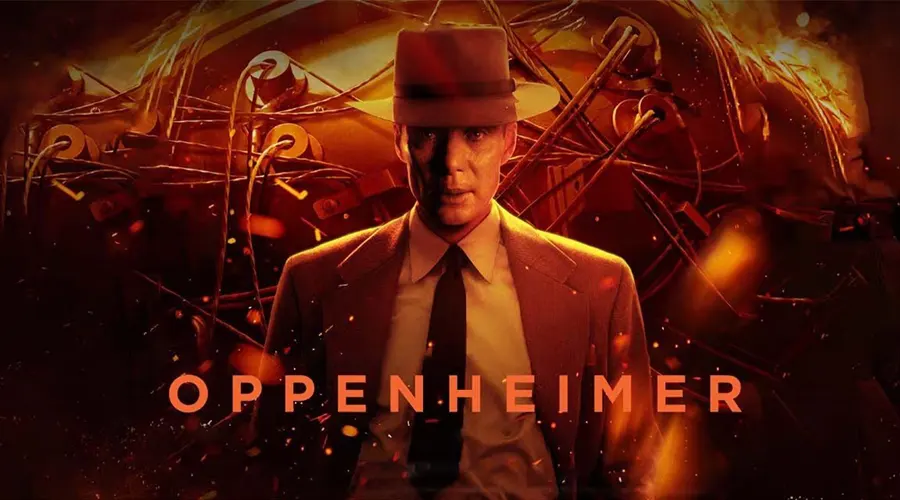Oppenheimer Movie Review
Who was J Robert Oppenheimer? A physicist famously referred to as the ‘father of the atomic bomb’, yes. But aside from him developing nuclear warfare, I have no idea. I stepped into Christopher Nolan’s most dizzyingly challenging work with no prior knowledge of who Oppenheimer was, his story, or the specifics and significance of what he did. I was hoping the movie – which is based on Kai Bird and Martin J Sherwin’s book American Prometheus – would tell me.
The film gives a glimpse into Oppenheimer's mind
Nolan’s latest is about the man (played by a bravura Cillian Murphy), who changed the course of human history, and his complicated relationship with his own legacy. It’s an effective ‘biopic’ to the extent that it refuses to blandly blaze through bullet points and rattle off a set of highlights from his life. Instead, it takes you inside his mind. Often quite literally.
Using Oppenheimer’s 1954 trial and cross-examination as a narrative device – which took place years after the horrific 1945 Hiroshima and Nagasaki bombings that cost over 200,000 lives – the film takes us through his early years. We’re introduced to young Robert studying his way through Europe’s most renowned institutions. He’s the kind of brilliant mind, who casually learns conversational German over a few months so he can deliver a lecture on quantum physics in Germany.
Cursed with knowledge and burdened by genius, he sees the matter and atoms that make up the world around him. Robert quite literally sees the vibrancy of life. One fellow academic compares it to “being able to hear the music”. To give us a glimpse into his singular mind, Jennifer Lame’s visceral editing intercuts Robert’s conversations with people, with visuals of hauntingly beautiful explosions, collapsing stars, and chemical reactions.
That is until years later, when he witnesses his work leading to the deaths of hundreds of thousands of people, leaving him forever changed. His life’s work - the theory and possibilities he’s held so dear becomes a horrific reality. In an instant, ideas and innovation become atrocities. From that moment on, he no longer sees glimpses of life, atoms, or matter. All he sees is death and destruction.
Oppenheimer Movie: Synopsis
A chilling biographical drama, Oppenheimer delves into the life of American physicist J. Robert Oppenheimer, known as the 'Father of Atomic Bomb’. The film chronicles the events that precede and succeed the world’s first nuclear test led by Oppenheimer for the US Army, code-named ‘Trinity’.
Oppenheimer Movie: Cast
David Krumholtz as Isidor Isaac Rabi, Josh Hartnett as Ernest Lawrence, Alden Ehrenreich as Rich Feynman, and an excellent Tom Conti as Albert Einstein - arguably responsible for the film's finest scenes. It was also magnificent to see Robert Downey Jr (RDJ) the actor again, here as “antagonist” Lewis Strauss. It’s a very curious casting move to have RDJ – a man who spent the last decade playing a superhero, who’s an egotistical genius – here playing a man, who has all of the ego and none of the genius, but is cursed to be surrounded by them. Not to mention a commanding Emily Blunt as Robert’s wife Kitty Oppenheimer. While I remain unimpressed by Nolan’s female characters, Kitty gets one of the film’s most rousing, crowd-pleasing scenes which is an absolute joy to watch.
At its core, Oppenheimer is about the messy, deeply unnerving intersection between science and politics. How selfish, self-serving leaders are awarded unbridled power. How wars and governments corrupt, contaminate, and bastardize science. Would you truly want peace if your life’s pathbreaking work has been to build a bomb? Is it all in service of your country, or is a world on the brink of war merely the ideal circumstance to enable your work? To answer these questions, Nolan examines one pathetic US government tragedy after the other.
The atomic bomb was built to fight the Nazis. But with Hitler defeated, it’s almost as if America’s leaders had a shiny new toy with no use for it. So, they imagined one. “It's no longer Hitler that's the greatest threat to the world. It's our work” someone says to Robert.
Oppenheimer Movie: Review
Love and regret lie at the heart of Christopher Nolan’s movies no matter how complex and demanding they seem in structure and storytelling. True to his style in spirit but deviating from the usual in execution and content, the British director creates a moving masterpiece on human disillusionment. How a man’s biggest discovery and bravery marked his biggest doom. Oppenheimer may have been a genius, but he wasn’t acquainted with the ways of the world. He spoke his mind, trusted everyone, and paid a price for it.
Talkie and dense, the film unravels like a psychological horror-investigative thriller even as it recreates known historical events. IMAX cameras go dangerously close to the actors exposing every pore, every unsaid emotion, and every falling tear perfectly. Sound and silence especially in that chilling detonation scene, play an unsettling game of hide and seek. Ludwig Göransson’s music lends the film its unnerving ticking time bomb nature. Nolan keeps amplifying your anxiety, holding you captive emotionally with no interest to slow down. You find yourself being moved to tears as he finally releases his flawed lead character from the prison of his own guilt.
The 3-hour film is based on a Pulitzer Prize-winning biography called ‘American Prometheus: The Triumph and Tragedy of J. Robert Oppenheimer’. It meticulously follows the celebrated and controversial physicist's life story in a nonlinear fashion. The narrative shuttles between past and present while addressing the key events leading up to the nuclear test and its repercussions. These involve the American Jew’s equation with self, fellow scientists including Albert Einstein, political activism leaning left, implications of him being a Russian spy and revocation of his security clearance in an unfair government hearing.
A man who took great pride in his discoveries could never look it in the eye. The atomic bomb though only forms a section of the film, it largely studies the mindset of its creator. Oppenheimer’s ambition and relentless love for physics swamp him with a sense of impending doom and moral scruples. Nolan cleverly pits Oppenheimer’s heart against his mind and the disconnect between the two at the center of his film.
If you happen to be a World War II geek, you will get the Germany-USA-Japan-Russia arms race and socio-political situation better.
One man’s desire to combat fascism and save lives resulted in the destruction of human lives and no one could have played it better than Cillian Murphy. His piercing blue eyes convey agony and quiet anger remarkably. Robert Downey Jr and Emily Blunt are excellent. Matt Damon, Rami Malek, and Kenneth Branagh are well-cast in extended cameos.
Oppenheimer leaves you in tatters as it is a gripping piece on a man consumed by guilt and inner turmoil. “A man who became death, the destroyer of worlds.” You won't forget this film for a long time.
A memorable moment of the Oppenheimer Movie
In one scene, a group of leading US officials casually discuss which Japanese city to eradicate off the face of the Earth. One of them gently offers that it shouldn’t be Kyoto because “it’s a beautiful city. My wife and I honeymoon there”. To see such a soul-shattering loss of life approached with such heartless indifference is heartbreaking.
Arguably the most memorable moment of the film comes just after The Trinity Test – the first successful test of the atomic bomb. After a much-bated breath, as soon as it goes off, we don’t see the explosion itself, but merely the reaction on Oppenheimer’s face. It’s a moment of relief. Of seeing his genius recognised. His theory made a reality. Similarly, we’re never made to see the horrors of Hiroshima itself, but merely the look on his face as he watches the images of the aftermath and the destruction he wrought. I did find it curious, however, that the film’s clearest objective is to have us feel for Robert and how his government turned on him, and not the staggering loss of life in Japan.
Through its blistering tale of destruction, Oppenheimer deconstructs the idea of what a “biopic” should be. A statement of facts peppered with context and perspective? Or something greater? The end of a conversation, or the beginning of one? In asking us a series of important questions, Christopher Nolan crafts a piece of cinema that may not serve as a spectacle, but it certainly is epic.







Comments (0)